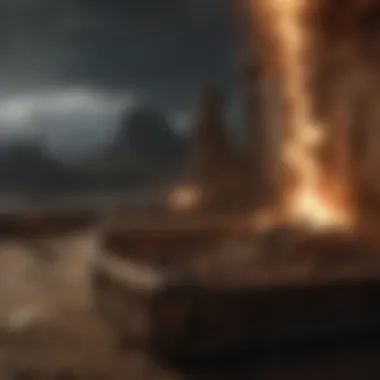Analyzing the Impact of Game of Thrones' First Episode


Intro
The first episode of Game of Thrones, titled "Winter Is Coming," serves as the cornerstone for the intricate world of Westeros. It introduces viewers to a complex narrative brimming with deep character dynamics and overarching themes that resonate throughout the series. This article aims to dissect the episode meticulously, unraveling its significance and the way it sets the stage for future developments. By examining key characters, pivotal plot points, and the underlying themes, we can gain a clearer insight into both the immediate impact of this episode and its lasting legacy.
Character Dissections
Detailed Analysis of Key Characters
The episode introduces several principal characters, each unique in their motives and backgrounds. Eddard Stark, played by Sean Bean, epitomizes the Northern values of honor and duty. His role is crucial as he is the head of House Stark and stands as a moral anchor within the story. Moreover, his relationship with his family, particularly his children—Robb, Sansa, Arya, Bran, and Rickon—illustrates the dynamics of a noble family in a land fraught with danger. Additionally, we meet Jon Snow, Eddard's illegitimate son, whose sense of belonging is continuously tested.
Daenerys Targaryen, portrayed by Emilia Clarke, is introduced as a vulnerable figure, subject to the whims of her brother Viserys, who is obsessed with reclaiming the Iron Throne. Her character arc takes a profound turn throughout the series, starting with this moment of powerlessness. The contrast between Eddard's honor and Daenerys's initial subjugation sets up a compelling narrative trajectory.
Character Development Throughout the Series
Throughout the series, characters evolve significantly. Eddard Stark’s commitment to honor eventually leads to tragic consequences, emphasizing the harsh realities of power in the Seven Kingdoms. Conversely, Daenerys’s growth from a meek girl to a formidable leader symbolizes resilience and empowerment, making her one of the most compelling arcs in the series.
Impact on the Overarching Storyline
The foundational introduction of these characters in the first episode is pivotal for understanding their future roles. Eddard's integrity clashes with the deceit of many other players in the game of thrones, while Daenerys's journey connects to themes of power and identity. The episode sets the stage for numerous conflicts that will unfold, illustrating how personal choices impact the larger political landscape.
Episode Breakdowns
Recap of Significant Events in Each Episode
"Winter Is Coming" is characterized by establishing key relationships and conflicts. The episode opens with the ominous presence of the White Walkers, immediately introducing viewers to the supernatural threats lurking beyond the Wall. The stark shift between the mystical and the political intrigues viewers from the onset.
Eddard’s journey to the South alongside his family to answer the call from his old friend, King Robert Baratheon, signals the intertwining of various plotlines. The gathering of characters and their interactions, such as the tension with the Lannisters, are crucial in foreshadowing the series' dramatic developments.
Exploration of Themes and Symbolism
The recurring themes of loyalty, family, and the harsh nature of power emerge vividly throughout this episode. The direwolf serves as a symbol of House Stark, embodying both protection and foreboding. Each Stark child discovering and bonding with their direwolf parallels their connection to fate and identity.
Key Moments and Their Implications
One of the most gripping moments occurs when Bran witnesses something he should not have and the subsequent consequences for his family. This incident not only drives much of the first season's conflict but also embodies the broader theme of knowledge and its dangers. The episode leaves the audience with a sense of dread and anticipation for what is to come.
Lore Explorations
Delving into the Rich History and Lore of Westeros
Understanding the lore of Westeros is integral to appreciating Game of Thrones. The first episode briefly touches upon the history of the Seven Kingdoms, including the backstory of the Targaryens and the implications of the Iron Throne. The mention of House Stark’s roots and their ancestral home, Winterfell, adds depth to the narrative.
Uncovering Hidden Details and Connections
The pilot episode is rich with foreshadowing and hints at future plotlines. Details surrounding the Stark family dynamics and their views on honor versus ambition are laid out clearly, setting up conflicts that will resonate throughout the series. Notably, the uneasy relationship between the Lannisters and Starks hints at the undercurrents of betrayal.
Exploring the Cultural and Mythical Aspects of the World
Westeros is steeped in cultural and mythical references that enrich the viewing experience. The traditions of each house, such as the Stark's connection to the North and its brutal winters, contrast sharply with the opulence of King’s Landing and the Lannisters. Such contrasts deepen the thematic layers of power struggles and morality inherent in the story.
Fan Theories
Compilation of Popular and Intriguing Fan Theories
Fans have speculated about various elements introduced in this episode. One popular theory revolves around the true parentage of Jon Snow, suggesting connections that may resonate with future events.
Evaluation of Theories Based on Evidence from the Show
The intricacies of this episode lend themselves well to such fan theories, particularly given the subtle hints dropped about lineage and loyalty. This encourages viewers to revisit the episode with a critical eye allowing for deeper appreciation.
Speculation on Future Plot Developments
The foundation laid in "Winter Is Coming" sparks intrigue about various character fates. Viewers speculate on Eddard's decision-making as he becomes embroiled in the politics of King’s Landing, creating a desire to understand the consequences of these choices.
This analysis captures the essence of the first episode of Game of Thrones, showcasing its profound influence on the series' overarching narrative. By unraveling character dynamics, important plot points, and rich lore, both casual viewers and devoted fans can find new insights in this remarkable opening chapter.


Preamble to Game of Thrones
Game of Thrones is not only a television series but a cultural phenomenon that has left a lasting impact on the landscape of modern entertainment. Based on George R. R. Martin's book series, "A Song of Ice and Fire," it introduces a complex world filled with intricate politics, multifaceted characters, and unexpected plot twists. The first episode serves as a vital entry point for viewers, laying down the groundwork for the multifarious narratives that will unfold throughout the series.
The initial episode sets the tone, style, and character dynamics that will define the show. By establishing a dark, gritty atmosphere, it differentiates itself from other fantasy genres, making it crucial to understand how it does so. The audience encounters a plethora of themes and ideas, such as ambition, family loyalty, and the moral ambiguities of power. These elements resonate deeply with viewers, inviting them to ponder broader questions of morality, loyalty, and human nature.
This section serves not just as an introduction but also as a bridge into the deeper analysis provided in subsequent sections. It invites both new viewers and long-time fans to reconsider their understanding of the show from its inception. The significance of this introduction cannot be overstated, as it frames the discussions surrounding character development and plot progression seen in later episodes.
The examination of the first episode illustrates the layers of complexity that Game of Thrones embodies. Each character and plot element introduced becomes a piece of a larger puzzle, influencing the unfolding narrative. Understanding this is essential for appreciating the series as a whole, which continues to thrive in discussions across forums and social media, such as on Reddit and Facebook.
In summary, the introduction to Game of Thrones is pivotal. It is a lens through which viewers begin to explore the rich tapestry of the story, setting the stage for a saga filled with intrigue and depth. This analysis will further explore essential aspects of the first episode, aiding in a comprehensive understanding of its significance in the broader context of the series.
Overview of the First Episode
The first episode of Game of Thrones, titled "Winter Is Coming", serves a crucial role in setting the stage for the entire series. It is not merely an introduction but a complex tapestry of characters, themes, and plots that intertwine to build the rich world we see throughout the show. Understanding this episode is essential for both casual viewers and dedicated fans, as it encapsulates the tone and the narrative style that defines the series.
From the onset, the episode establishes the bleak, unforgiving world of Westeros. It introduces the Stark family, who serve as the moral center of the plot. The first episode outlines how power struggles, loyalty issues, and family complexities will come into play across seasons. This background knowledge enhances the viewers’ ability to grasp the evolving dynamics that unfold in subsequent episodes.
Title and Air Date
The first episode aired on April 17, 2011. Its title, "Winter Is Coming", is a poignant reminder of the looming threats that lie ahead. This phrase is not just a seasonal reference; it embodies the overarching theme of caution and preparation that the series often emphasizes. The title itself signifies a deeper warning within the narrative, revealing how the characters must be ever-vigilant against both external and internal forces.
Episode Synopsis
"Winter Is Coming" opens with the chilling prologue where members of the Night's Watch encounter a supernatural threat beyond the Wall. This encounter is vital in foreshadowing the dangers that will come to play in the series. Following this, the storyline shifts to Winterfell, where we meet Eddard Stark, the honorable lord of the North, and his family. The episode explores the relationships between characters such as Eddard, Catelyn Stark, and their children, while also establishing the political tension with the Lannisters in King’s Landing.
In a pivotal moment, Bran Stark witnesses a secret encounter that leads to his eventual fall from a tower, setting off a chain of events that will significantly shape the narrative. The episode also introduces the tension between the Stark family’s commitments and the dangerous politics of the realm.
Initial Reception
Upon its release, "Winter Is Coming" received a mix of acclaim and critique. Viewers were drawn to its complex characters and intricate plotlines. The production quality, including cinematography and set design, was noted as revolutionary for television at the time. Many critics praised the depth of the storytelling and the ability to maintain viewer engagement through a rich narrative.
"Game of Thrones introduces themes that captivate audiences from the very first episode, leading them to question morality, loyalty, and power dynamics."
However, some viewers were unfamiliar with the extensive lore from the source material and found it challenging to grasp all the nuances in a single viewing. This initial puzzlement underscores the ambitious nature of the series, aiming to create a multi-layered world that demands attention.
The first episode plays a foundational role in the success of Game of Thrones, as it not only introduces key elements but also encourages engagement with the subsequent narratives.
Key Themes Introduced
The first episode of Game of Thrones introduces several critical themes that are essential to understanding the intricate narrative of the series. These themes not only reflect the characters' motivations but also set the stage for the various conflicts that shape the storyline. Examining these themes provides insight into the moral complexities faced by the characters and the overarching message of the series. Each theme interweaves with others to create a rich tapestry of storytelling that engages the viewer on multiple levels.
Power and Politics
The theme of power is prevalent throughout the first episode. It is evident in the dynamics between houses, particularly the Stark and Lannister families. Eddard Stark is introduced as a man of honor, yet he becomes embroiled in the vicious political landscape of Westeros. The significance of power dynamics is not merely in the quest for the Iron Throne, but also in the personal relationships between characters. The shifting loyalties and ambitions foreshadow the relentless nature of political maneuvering. Moments such as the arrival of King Robert Baratheon, seeking Stark’s allegiance, emphasize the delicate balance of power that defines the series.
Loyalty and Betrayal
Loyalty and betrayal are inseparable themes that appear early in the series. The characters constantly grapple with their loyalties to family, friends, and duties. The Stark family embodies loyalty, but they are also shown to be vulnerable to betrayal from those closest to them. Jon Snow, as the illegitimate Stark son, experiences the theme of loyalty in a unique way. His journey reflects the internal conflict of needing to prove his worth while living under the shadow of his identity. The betrayals that unfold demonstrate the risks associated with loyalty, suggesting that it can be both a strength and a weakness.
Family Dynamics
Family plays a crucial role in shaping the characters' decisions and actions. The Stark family's interactions reveal the values of honor and duty, which guide their relations. Catelyn Stark's fierce protectiveness over her children contrasts sharply with the colder, more calculative approaches of other houses. The complexity exhibited in the Stark family's dynamic serves as a microcosm for the larger conflicts in Westeros. The episode lays the groundwork for exploring how family ties influence political allegiance and personal choices throughout the series.
"The Stark family represents the heart of the story, grounded in principles that often clash with the brutal realities of their world."
Character Prefaces
Understanding character introductions is vital in analyzing the first episode of Game of Thrones. Each character plays a specific role that contributes significantly to the overarching narrative and the themes explored in the series. Through these introductions, viewers learn about the complex relationships, motivations, and ideals that drive the storyline. The character dynamics become central to the viewer's engagement with the plot, as the intricacies of loyalty, power, and ambition unravel in future episodes. Moreover, these introductions set a foundation that enhances character development, making them relatable or detestable, depending on the viewer's perspective. Above all, effective introductions can draw viewers deeply into the world of Westeros, prompting questions and discussions that extend well beyond the initial viewing.
Eddard Stark
Eddard Stark, the Lord of Winterfell, is introduced as a man of honor and integrity. His character represents the stark contrast to the undercurrents of deceit and ambition seen in later episodes. Eddard’s unwavering commitment to justice is displayed when he executes a deserter of the Night's Watch, establishing his moral compass early on. His respectful relationships with his family and subjects underline his role as a respectable leader in the North. Through Eddard, viewers are prompted to consider the burdens of leadership and the implications of doing what is right, even when faced with difficult decisions. His character foreshadows the challenges he will face as the series progresses, particularly when confronted with the moral ambiguities of power.
Catelyn Stark
Catelyn Stark, Eddard's wife, is introduced as fiercely protective of her family. She embodies the themes of loyalty and maternal instinct. Her character provides a strong counterpoint to Eddard’s more stoic demeanor. In the first episode, Catelyn's determination is evident in her efforts to keep her family safe, especially concerning dangers from the Lannisters. Through her introduction, viewers experience the personal stakes involved in the power struggles of Westeros. Catelyn's perspective amplifies the viewer's understanding of family dynamics within the Stark household, particularly when it comes to her feelings towards Jon Snow, Eddard’s illegitimate son. Her complex feelings towards Jon create a layered narrative that unfolds further throughout the series.


Jon Snow
Jon Snow, raised as Eddard's illegitimate son, is thrust into a complex identity crisis. His introduction offers an immediate invitation for empathy. Jon feels the burden of exclusion and the struggle for acceptance within his family, particularly in comparison to his legitimate siblings. This tension resonates with viewers who can relate to feelings of isolation. His decision to join the Night's Watch reflects a desire for purpose and belonging beyond the Stark household. Jon's journey becomes significant as the series progresses, illustrating themes of honor and sacrifice. His character's evolution from an outsider to a key player in the battle for survival in Westeros adds depth to the narrative, inviting viewers to engage with his ongoing struggles.
Daenerys Targaryen
Daenerys Targaryen is introduced as a character whose arc starts from vulnerability. Initially, she is portrayed as a pawn in her brother Viserys’ quest to reclaim the Iron Throne. Her transition from an oppressed young woman to a powerful leader begins subtly, setting the stage for her transformation later in the series. The portrayal of her initial relationship with Khal Drogo serves as a significant plot point, marking the beginning of her journey towards self-realization and empowerment. Daenerys embodies the themes of resilience and the quest for identity, encouraging viewers to consider the implications of agency in a patriarchal world. Her character serves as a vehicle for discussing the restoration of power and the reclamation of one’s rightful place in the world.
Tyrion Lannister
Tyrion Lannister enters the scene with a unique blend of wit and intelligence. His character is vital for introducing the theme of perception versus reality within the series. Despite his status as a dwarf, Tyrion navigates the treacherous political landscape with shrewdness and humor. His candid remarks about the power dynamics that shape the lives of those around him reflect a keen understanding of human nature. In the first episode, Tyrion’s interactions, especially with Jon Snow, reveal a sense of camaraderie between two outsiders. Through his character, the series hints at the complexities of family loyalty and the burdens of being underestimated. Tyrion's role will become more significant as the series continues, providing commentary on both the absurdities and brutal realities of power dynamics.
Significant Plot Points
The initial episode of Game of Thrones is crucial for establishing the narrative framework of the series. Significant plot points introduced in this premier episode serve as the foundation for character arcs and thematic explorations that will unfold over multiple seasons. These events create a ripple effect engaging the audience both emotionally and intellectually, showcasing the complexity of relationships amidst a tumultuous backdrop.
The Wight Encounter
The episode opens with a chilling scene: a group of Night's Watchmen encountering wights, the undead minions born from dark magic. This moment not only sets the tone for the series' darker themes but also introduces the audience to the supernatural elements that will become central to the story. The fear instilled in the rangers foreshadows the peril that characters will face as the series progresses.
This encounter is significant because it establishes the imminent threat posed by the White Walkers. As viewers witness the betrayal and brutality of the first wight attack, it becomes evident that no character is truly safe. This understanding cultivates a sense of tension and anticipation, pushing the audience to consider the unpredictable nature of power and survival in Westeros.
Bran’s Fall
Shortly after the wight encounter, Bran Stark’s fall from the tower becomes a pivotal moment. While climbing to watch a secret meeting, he bears witness to an act of betrayal involving Cersei and Jaime Lannister. Jaime's push of Bran from the tower emphasizes the brutal reality of political intrigue within the realm.
Bran’s injury and subsequent fate significantly impact not just his character development, but also the overarching Stark family narrative. His fall serves as a catalyst for the remaining Starks, creating divisions and setting the stage for their individual storylines. The seriousness of his fall signals to viewers that actions carry severe consequences, a recurring theme throughout the series.
The Stark Family Dynamics
The portrayal of the Stark family in this episode outlines complex dynamics that resonate with viewers. Each character's interaction presents a glimpse into their values, commitments, and vulnerabilities, establishing familial loyalty as a central theme. Eddard Stark, as the patriarch, embodies honor and duty, but also faces challenges in reconciling his values with the harsh reality of leadership.
Catelyn Stark's protective nature over her children adds depth to her character and demonstrates the lengths to which a parent will go. This theme of family loyalty is contrasted with the treachery seen in other houses, making the Stark’s allegiance more poignant. The audience begins to sense that the Starks, despite their noble intentions, may not be shielded from the chaos engulfing the realm.
Daenerys’ Transformation
In the visual narrative of Game of Thrones, Daenerys Targaryen's initial portrayal acts as a counterpoint to the Starks. Sold into a marriage with Khal Drogo, she transitions from a scared young woman into a position of power. Although she begins as a pawn in her brother's ambitions, the episode hints at her latent strength and determination.
Her transformation is not merely a personal journey; it mirrors the tumultuous quest for empowerment in a world governed by male dominance. Daenerys’ arc serves to challenge perceptions of gender roles within the series. As the story progresses, her metamorphosis showcases themes of identity, agency, and the complexities of ruling.
"Daenerys starts as a victim in her brother's schemes, yet her journey hints at a powerful evolution."
These pivotal moments encapsulate the essence of Game of Thrones, illustrating how personal choices and external forces shape fate. The intertwining narratives create a rich tapestry of conflict and emotion that captivates the audience, ensuring the first episode leaves an indelible mark on both casual viewers and dedicated fans.
Filming Techniques and Selection
The filming techniques and selection employed in the first episode of Game of Thrones play a crucial role in establishing the tone and atmosphere of the series. These foundational elements not only enhance the visual storytelling but also significantly contribute to the narrative's depth. Understanding the craftsmanship behind the scenes helps viewers appreciate how technical choices affect audience perception and engagement.
Cinematography Styles
Cinematography is the art of capturing visual narratives through camera work. The first episode uses a variety of styles to create distinct moods across different scenes. D.P. Adam Greenberg employs a muted color palette to reflect the somber and often cold world of Westeros. The camera movements are fluid yet deliberate, allowing viewers to immerse themselves in the unfolding events without distraction. This careful calibration of lighting and shot composition lays the groundwork for how viewers experience the power struggles and emotional stakes among characters.
"The visual style of a show like Game of Thrones requires an intricate balance of realism and artistry to maintain its immersive experience."
Furthermore, close-up shots emphasize character emotions, making the audience more invested in their arcs. Meanwhile, wide shots capture expansive landscapes, signifying the vastness and isolation of the setting. Each choice reflects the intricate world-building that defines the series.
Sound Design
Sound design in Game of Thrones is another critical component that enhances storytelling. The soundscapes created in the first episode subtly underscore key moments, guiding viewers' emotional responses. The use of ambient sounds, such as wind or distant howls of wolves, evokes a sense of foreboding, reinforcing the dark themes present throughout the narrative.
Additionally, foreshadowing is often woven into the audio. For instance, the haunting score complements moments of tension and drama. Composed by Ramin Djawadi, the music becomes a character in its own right, heightening key scenes and adding layers to character emotions. The careful alignment of sound to visuals is essential in creating a cohesive viewing experience, as it allows viewers to feel the intensity of conflicts and relationships.
Costuming and Set Design
Costuming and set design bring to life the intricate details of Westerosi culture and history. The first episode successfully utilizes both elements to reflect character traits and societal hierarchies. For instance, Eddard Stark's heavy furs signal his role as a noble, while the muted tones of the Lannisters suggest a more cunning disposition.


The production design also plays a significant part. The sets, ranging from the Stark household in Winterfell to the caverns beyond the Wall, are meticulously crafted to immerse viewers in the fantasy world. Each location reflects the story's tone and context, contributing to the series' overall authenticity.
In summary, the filming techniques and selection in the first episode of Game of Thrones are vital to the series' effectiveness. They convey the complexities of the narrative, enhance character development, and root the viewer in the stark realities of the world. These choices serve to engage and intrigue audiences, paving the way for the sweeping saga that follows.
The Impact of the First Episode
The first episode of Game of Thrones serves as a crucial entry point into the intricately woven world of Westeros. Its impact extends widely, shaping not only character arcs and plot development in subsequent episodes but also influencing viewer perceptions of the entire series. By establishing key themes, character dynamics, and engaging storytelling techniques, this episode sets the stage for significant developments throughout the show.
Influencing Future Episodes
The foundational elements introduced in the first episode resonate through the entire series. For instance, the stark contrasts between the noble Stark family and the treacherous Lannisters create a framework for understanding the ongoing conflicts that develop later. The dynamics between these houses become central to the narrative fabric of the show.
Key points of influence include:
- Character Development: The complexities of characters introduced initially, particularly Eddard Stark and Daenerys Targaryen, establish a trajectory that dictates their future decisions and relationships throughout the series.
- Plot Lines: Events such as Bran’s fall and the introduction of direwolves foreshadow much larger plots. These initial moments play a significant role in how viewers connect threads across episodes.
- Theme Introduction: Themes of power struggles and loyalty are not just introduced; they permeate into later conflicts, enriching the narrative and maintaining viewer interest.
Legacy in Television History
The first episode of Game of Thrones is more than just an introduction; it redefines the landscape of modern television drama. At its release, it embodied a shift in storytelling techniques, particularly in the fantasy genre. Unlike their predecessors, the series capitalizes on high production values, character depth, and morally ambiguous narratives, engaging viewers on a deeper level.
- Cultural Impact: Game of Thrones sparked discussions about narrative complexity, leading audiences to appreciate multi-dimensional characters and their moral dilemmas.
- Revolutionizing Fantasy Genre: The production set new standards for adaptations from literary sources, demonstrating that they could be as engaging and visually stunning as original works.
- Awards and Recognition: The episode and subsequent seasons garnered numerous awards, reinforcing the show's status and legacy within television history.
By examining its effects on future episodes and its overall legacy, one gains a full appreciation of how this initial offering continues to resonate with fans and critics alike.
Audience Engagement and Interpretation
Understanding audience engagement and interpretation is crucial to appreciating the first episode of Game of Thrones. This episode serves as a gateway, introducing viewers to the complexities of its world and characters. It invites audiences to immerse themselves in a rich narrative, setting the stage for future explorations in the series.
One particular strength of the episode lies in its ability to tap into the viewers’ imagination. Through well-defined characters and intricate plot details, it encourages fans to theorize about motivations, outcomes, and relationships. Such engagement catalyzes discussions, both online and offline, forming a community of dedicated watchers who analyze every nuance and foreshadowing. The importance of this discussion cannot be understated as it enhances the viewing experience, making it more interactive and engaging.
Moreover, audience interpretation plays a significant role in dictating the series' cultural impact. How viewers perceive characters and their dilemmas can lead to various interpretations of themes such as power and loyalty. This diversity enriches the narrative, allowing for multiple perspectives on the same storyline.
"The first episode does not merely tell a story. It opens a dialogue with its viewers, inviting them to become part of its narrative world."
As the series progresses, viewers' interpretations evolve, shaped by character arcs and plot developments. Fans discuss their theories on platforms like Reddit and engage in critical discourse, driving both popularity and viewership. This ongoing interaction with the content not only sustains interest but also establishes a loyal fan base, which is paramount for any long-running series.
Fan Theories Arising
The first episode of Game of Thrones ignites a firestorm of fan theories, each attempting to unravel the intricacies of its plot and characters. From the initial introduction of the Stark family to Daenerys Targaryen's humble beginnings, many aspects are open to speculation.
For instance, the mystery surrounding Jon Snow's parentage becomes a topic of intense discussion. Viewers often speculate on whether he is truly the illegitimate child of Eddard Stark or if there is a deeper connection to House Targaryen. Such theories are fueled by subtle clues scattered throughout the episode, keeping audiences invested in unraveling these mysteries.
Another prevalent theory concerns the nature of the wights encountered in the woods. The implications of such supernatural beings raise questions about the forces at play in Westeros and how they will affect the power dynamics among the living characters. These theories not only spark excitement but also engage viewers in active analysis.
Critical Analysis Over Time
As the series progresses, the first episode of Game of Thrones becomes subject to critical analyses that reveal the depth of its storytelling. Scholars, critics, and fans alike revisit this inaugural installment with fresh eyes as they deepen their understanding of its elements.
Over time, discussions have shifted from immediate plot points to broader themes of morality, power, and familial bonds, revealing how the initial narrative layers connect to deeper philosophical questions. Critics often highlight how the episode lays the groundwork for character development and thematic exploration.
This means the first episode is more than just an introduction; it is a well-crafted piece of literature. It serves to highlight plot foreshadowing and thematic resonance, making the critical discourse surrounding it continually relevant.
Thus, as the episodes unfold, viewers’ initial interpretations of the first episode are continually revised, reflecting the character histories and shifting relationships forged over time.
Through these complex layers, the first episode stands as a testament to the power of storytelling, encouraging ongoing dialogue among its fans.
End
The conclusion of an analysis serves as a critical synthesis of the elements discussed throughout the article. In relation to the first episode of Game of Thrones, it encapsulates the foundational aspects that create layers of depth in both narrative and character development. This section draws connections among themes, introduced characters, and significant plot points, reaffirming their importance in the context of the entire series.
Final Thoughts on Episode One
The initial episode of Game of Thrones, titled "Winter Is Coming," sets a formidable tone for the series. It introduces diverse characters whose motivations and relationships will evolve. Notable characters like Eddard Stark and Daenerys Targaryen are shown in their early complexities, foreshadowing significant arcs ahead. The episode poses questions about morality, authority, and familial bonds, compelling viewers to invest emotionally.
Critics have highlighted how effectively the episode establishes its setting, the harsh realities of Westeros, and the intricate political landscape. Further, the cinematography and sound design reinforce the mood, complementing the narrative. This careful crafting makes the episode not just an introduction but a captivating experience.
Direction for Future Content
Looking ahead, the success of the first episode points to the necessity of examining subsequent episodes. Future analyses can benefit from understanding how characters developed or themes evolved. It is essential to track character arcs as they intertwine with overarching plots and how audience perceptions shift over time.
Furthermore, exploring audience engagement and fan theories can provide insight into the community's interpretations, enriching the discourse around the series. By addressing these future avenues, it becomes possible to enhance appreciation for Game of Thrones' complexities and legacy.
"The start sets the stage for the complexities that unfold throughout the series, making it a crucial focal point for discussion."



